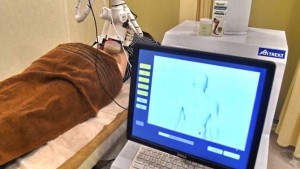A robot masseuse is currently treating patients in a Singapore medical clinic. Expert Manipulative Massage Automation, or Emma, was introduced just last year as a part of an ongoing project to assist physiotherapists of the future. Now, as Emma 3.0, the one-armed robot is currently assisting doctors and massage therapists alike.
Emma was developed by AiTreat, a Singapore-based startup company, and launched on Monday, October 9 at the NovaHealth Traditional Chinese clinic. According to AiTreat, the experience Emma provides is indistinguishable from a professional masseuse. However, the robot isn’t meant to replace massage therapists.
Rather, Emma is meant to help physiotherapists assist patients as the demand for massage therapy increases. Emma’s arm and silicone tips mimic the human thumb and palm. The robot’s movements are specialized for knee and back massages. Statistics show that up to 80% of the U.S. population will experience back pain at some point, so this robot has widespread potential.
The robot has additional sensors that measure the stiffness of the muscles and tendons in a given area. This allows the physiotherapist to keep track of the patient’s recovery and to enable Emma to provide the patient with the best possible massage necessary.
According to New Atlas, Emma will provide patients with greater opportunities for pain management at a lower cost over the period of their treatment. Up to 92% of patients have agreed in the past that massage therapy is especially effective in reducing pain.
Massage therapy reduces inflammation in injured areas, reduces swelling, breaks down buildup of lactic acid, and prevents muscle tightness in patients who need help with pain management.
With Emma’s help, massage therapists will be able to deliver these healing benefits in a shorter amount of time. While Emma works on one patient as instructed by the doctor or therapist, the massage therapist can then work on another patient at the same time.
“By using Emma to do the labor-intensive massages, we can now offer a longer therapy session for patients while reducing the cost of treatment,” said Albert Zhang, the founder of AiTreat. “The human therapist is then free to focus on other areas, such as the neck and limb joints, which Emma can’t massage at the moment.”
Photo: AFP / Roslan Rahman







